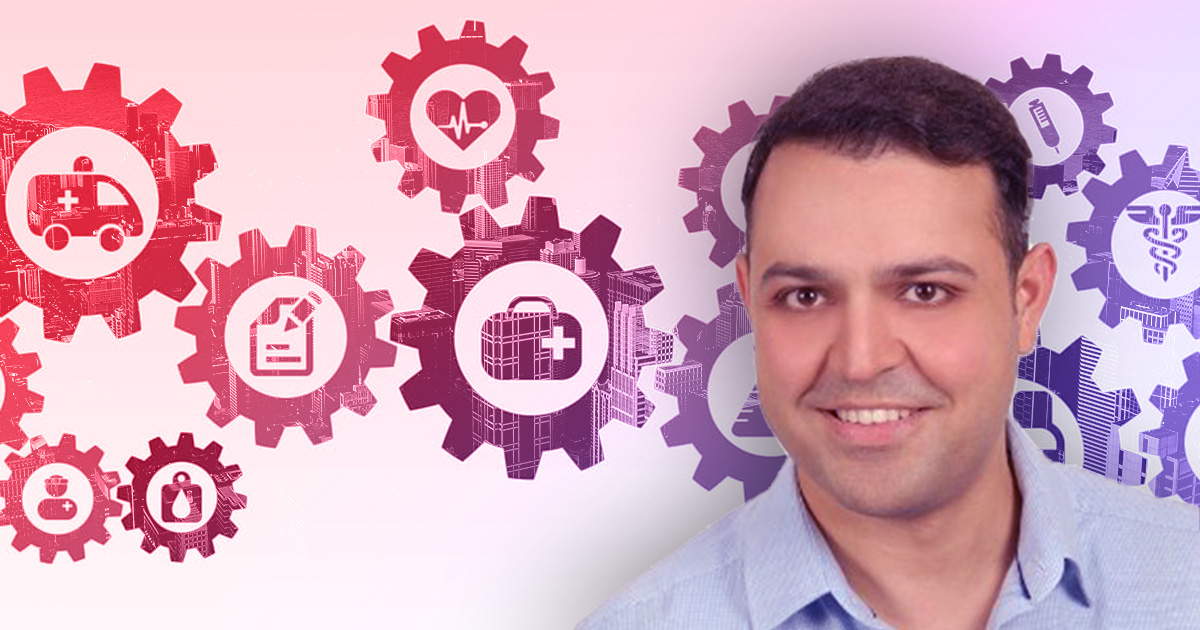
Darby Joyce
Content Marketing Coordinator
The COVID-19 pandemic highlighted existing issues with the US healthcare system and changed how many experts think about those issues. Exorbitant costs, telehealth capacities, discrepancies in care access, and supply chain interruptions were all exacerbated by the strain of a global health event, sparking new and renewed conversations about how to create a high-quality, equitable medical structure that can withstand such challenges.
Answering these new and vital questions is why Kogod professor of information technology and analytics Ozden Engin Cakici enjoys his work so much. A specialist in operations management focusing on healthcare systems, Professor Cakici has kept a close eye on how organizations and industries responded to the pandemic and how they can continue to improve.
“My research stems from following what is changing how healthcare institutions do business,” he explained. “For instance, the pandemic has had a huge impact on the supply chains of items such as medical equipment and pharmaceuticals, and telehealth services have skyrocketed. All of these questions are brand new, and I discuss them with my students in the classroom.”
Cakici pulls his perspectives on healthcare from a broad range of academic fields. After completing a bachelor’s degree in industrial engineering and a master’s in management science, he developed an understanding of how to manage an organization's financial aspects and optimize its systems. From there, he went to New York’s University of Rochester to earn a PhD in operations management.
“I wanted to pursue that PhD because I enjoy improving any system,” he said. “The study of operations management aims to answer fundamental questions about how systems work and how we can improve them.”
In healthcare, operations research explores relationships, processes, and incentives. A doctor-patient interaction can make or break the success of the healthcare service. These relationships become even more complicated when you add insurance providers, medical equipment suppliers, and government agencies. In the US, in particular, many healthcare providers and patients consider bureaucracy and tense conversations part of the medical process. Cakici notes that providers often don’t consider the managerial aspects of medicine.
“The biggest problem is incentive alignment,” he said. “When it comes to operational issues such as demand management or costs, as long as the healthcare provider gets the demand and gets paid by the insurance company, they often don’t get into the specifics of healthcare operations because they don’t need to.”
This is where operations management comes in. Cakici describes the field as combining the systems analysis of industrial engineering with the management study of a business school—a perfect fit for him, with his background in both areas. His research involves speaking with experts in the medical field to identify problems, then analyzing those problems to figure out where they come from and what about the current system needs to change to fix them. “As a researcher, I learn a lot from medical personnel since they’re the only ones who can explain how their processes work,” he explained.
We try to solve issues within the process, but we try to do it from the perspective of all the healthcare system’s stakeholders—patients, providers, and insurance companies, including government programs such as Medicare.”
-Mar-31-2023-04-57-47-6983-PM.png)
Ozden Engin Cakici
Professor of Information Technology and Analytics, Kogod School of Business
Once he understands medical professionals’ needs, Cakici can approach the issues from a more traditional business perspective. For example, some of his recent research explores the role of trade agents in procuring medical equipment for professionals in low- and middle-income nations. Cakici and his coauthors model several procurement scenarios for an agent in this situation, incorporating concepts like yield and outcome uncertainty often found in other supply chain studies.
While pursuing his PhD, Cakici became interested in understanding medical costs, which have only increased in recent years. “I realized that costs in healthcare have been rising rapidly, especially in the US, and that many issues can be analyzed and resolved through optimizing healthcare operations,” he said. “I aim to reduce costs in the healthcare system through analyzing these issues and proposing models that make operations more effective and efficient.” Through recent projects on the benefits and drawbacks of tele-triage and pay parity in telehealth, Cakici seeks opportunities to create healthcare systems that are high-quality, equitable, and priced fairly.
At AU, he’s uniquely positioned to put his research into action. Working in the nation’s capital gives him access to various organizations to connect with and learn from. “The resources at Kogod help me attend conferences, work with colleagues, and even meet with major national experts here in DC,” he said.
His research into pay parity in telehealth is reflected in the Telehealth Coverage and Payment Parity Act, a Congressional bill that proposes equal insurance coverage for in-person and telehealth medical services. Cakici’s research indicates that while telehealth increases access to care for acute conditions when the systems to provide high-quality care are in place, it also leads to more follow-up visits in practices where telehealth quality is lower than in-person quality. This means that a standard approach to payment and reimbursement runs the risk of lowering care quality for patients with certain issues since their issues are less likely to be fully recognized and treated if the telehealth setting isn’t fully developed.
Policymakers should not opt-in for one-size-fits-all policies. Instead, they should study the effectiveness of telehealth services for different illness types.”
-Mar-31-2023-04-57-47-6983-PM.png)
Ozden Engin Cakici
Professor of Information Technology and Analytics, Kogod School of Business
With that in mind, he proposes telehealth pay parity for specific services or, even better, promoting initiatives that improve the quality of telehealth and in-person healthcare.
Seeing his research reflected in policy discussions reminds Professor Cakici of the benefits of Kogod’s home in DC, and he tries to pass those benefits on to his students. His classes are discussion-heavy, allowing students to think about problems and come up with solutions together. “These types of discussions help them learn how to achieve analytical and critical thinking, a vital skill to the companies they’re interested in,” Cakici said. “I try to ensure my students are well-equipped and empowered before any job interview.”
Cakici also imparts lessons from his research to his students so they’re ready to pursue innovative goals once they’ve aced their job interviews. From his experience in operations management, he’s found that it helps to approach questions with a step-by-step mindset. “When looking at an issue, students should define the problem, ask the right questions to understand the process in detail, and pinpoint the critical parts of the process,” he explained. “From there, they can find the right tool to approach solving the problem, recommend multiple solutions, check their costs and benefits, and propose the best recommendation in the end.” By passing along this blueprint, Cakici hopes to send his students into the world ready to ask questions, solve problems, and develop the next significant improvements to the systems around us.
